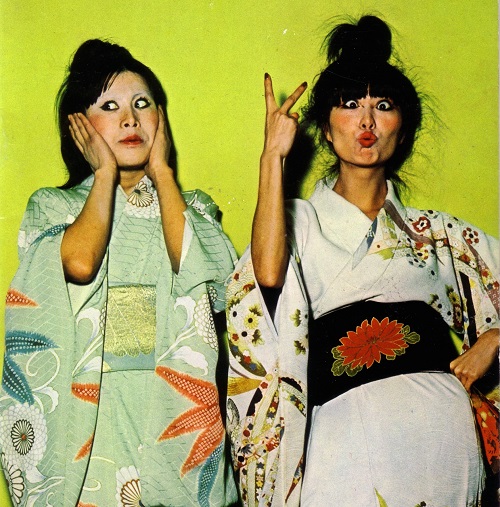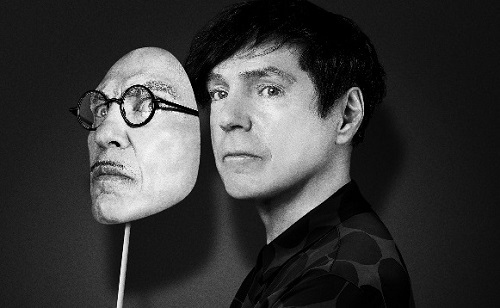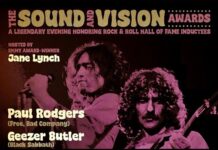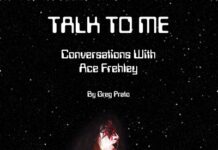By Ira Kantor
You’re instantly hooked in by the album’s opening notes — a keyboard ostinato that sounds like something out of the Ringling Bros. and Barnum & Bailey circus.
A few seconds later you hear a voice but not one that’s immediately identifiable to the human ear. It’s an unprecedented falsetto and you try to imagine if it’s a man singing…or maybe it’s a woman?
Then the exultant phrase is uttered: “This town isn’t big enough for the both of us…and it ain’t me who’s gonna leave!” Suddenly a musical shot goes off embodying the type of animal stampede described in the prior verse. Hard rock meets glam sensibilities.
You wonder two things in tandem: “What the hell is this?” and then, “This could be the greatest thing I’ve ever heard!”
Either way, what’s being put forth by the band Sparks is wholly original. Even if frontman Russell Mael singing the words “This town isn’t big enough for the both of us” is meant to be tongue in cheek, you can take seriously the notion behind the phrase; that the music industry likely isn’t ready (and maybe never will be) for this group – one that’s equal parts ahead of their time and a helium-fueled cabaret act. Once Russell hits the final banshee wail of “LEEAAAVVVEEEE!!!!” of the track, you’re convinced Vikings are climaxing in Valhalla.
Sparks’ breakout and breakthrough album, 1974’s Kimono My House is an attention-getter in all aspects. This opening song is one of the best to ever kick off any album. The cover seemingly pokes visual fun at the model-heavy beauties that adorn Roxy Music covers. And then there’s the group itself. Having made the leap from Halfnelson and two albums to a musical enigma not easily pigeonholed by style of substance, Russell and brother Ron (main lyricist and keyboardist) regroup with new musicians and a new take-charge attitude. It may not easily get them on the charts, but it certainly gets them out in front of an audience, however perplexed fans may be.
Go ahead, watch some of that great 1970s Musikladen or Top of the Pops footage. What do you see? The unacknowledged half-brother of Roger Daltrey moving so much you’re completely convinced he’ll fall off the stage (Russell)? A hybrid of Charlie Chaplin and Adolf Hitler with a cat that ate the canary smirk that both intrigues and terrifies (Ron)?
Is there a group you can actually compare Sparks to from that same era? Sure, singers like Bryan Ferry and David Bowie had no qualms exuding bravado and posturing on tracks like “Virginia Plain” and “Moonage Daydream,” respectively. Do they emanate Russell Mael’s intensity (or Ron Mael’s complete lack of intensity for that matter) though? Sure, bands like Queen defined the concept of over-the-top musicality (“Bohemian Rhapsody” anyone?) but was their mission to completely rip up musical aesthetics and commerciality and rework them into art that proved alien but was no less beautiful to hear?
Kimono My House, Sparks’ first album for Island, conjures up these thoughts. It’s somewhere in the spectrum of Marlene Dietrich and the Doors. Between Russell Mael’s regal ball-grabbing vocals and Ron Mael’s peppy piano/keyboard melodies unleashed as stoically as possible, you find yourself in for an adventure with this masterwork. With film director Edgar Wright re-exposing Sparks to the world with his new documentary, The Sparks Brothers, the time is right to dive back into Kimono and remind myself (and you) why it’s an underrated classic.
Let’s go back to “This Town Ain’t Big Enough For Both Of Us” for a moment. We can’t overlook the other notable musical elements of the track: a thumping bass (courtesy of Martin Gordon) and driving drums from Norman “Dinky” Diamond, which keep the intensity up throughout the track’s three minutes. While the brothers Mael would claim there wasn’t room for others, that wouldn’t stop others from trying to get at them. This song would ultimately prove to be Sparks’ biggest hit, climbing all the way to Number 2 in the U.K.
Other terrific Kimono songs include:
- “Amateur Hour” — Reflecting the circus mentality described earlier, this is a delightful romp that demolishes the standard for relationship songs. You have to laugh and admire anyone who has the tenacity to sing with pride, “She can show you what you must do to be more like people better than you!”
- “Falling In Love With Myself Again” — This is narcissism you can waltz to and just when you think Russell Mael’s voice can’t go any higher; he pulls it off. The same applies for the later rocker “Hasta Manana, Monsieur.”
- “Here In Heaven” — Here, we have a sonic thunderstorm of sound until Russell Mael coats the track with a falsetto that would make the Munchkins from the Wizard of Oz weep in awe. “In My Family” is a close second in this department.
- “Thank God It’s Not Christmas” — This right here is the definition of anti-pop. With one listen, you instantly visualize Santa Claus hurling the gifts down the chimney and getting the hell out of dodge.
- “Talent is an Asset” and “Complaints” — Both emphasize that the band isn’t afraid of seemingly making detours into the world of musical theater even if their calling card is more pop-rock.
Side note: For those who make it through this listening experience, I’d also like to recommend two other defining albums in the Sparks discography:
- Propaganda (1974) — This is essentially Kimono’s sequel in everything but title (hey, if it’s not broke, don’t fix it!). Highlights include the ballad (I guess…) “Never Turn Your Back On Mother Earth,” and the “Amateur Hour”-esque “Something For The Girl With Everything.”
- No. 1 In Heaven (1979) — This is arguably the band’s second greatest album, largely due to the fact that disco hitmaker Giorgio Moroder helps the Maels get more with the times. Equal parts zany and hypnotic, this album boasts such standout tracks as “La Dolce Vita,” “My Other Voice” and essentially the album’s title track, the trancelike “The Number One Song In Heaven.” Rumor is Ian Curtis and Joy Division had this song on loop when putting together “Love With Tear Us Apart.” If that doesn’t make Sparks completely viable, I don’t know what does!





















